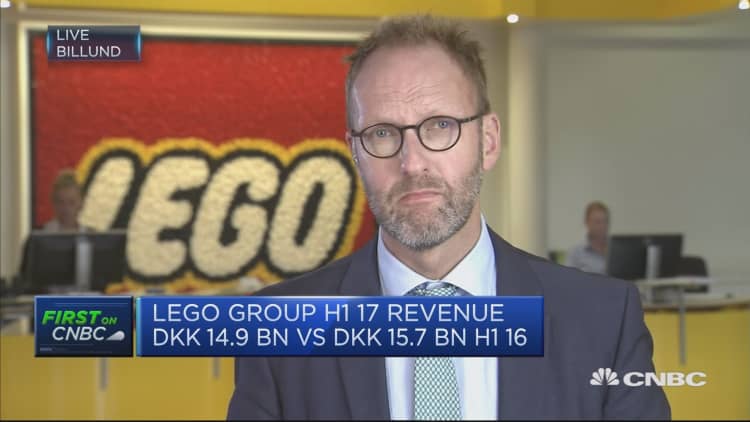Toymaker Lego reported its first sales fall in 13 years Tuesday, with CEO Niels B. Christiansen saying there would be no "quick-fix" for the company.
Lego explained that it had too many bricks in 2016, meaning that 2017 was spent selling off warehouse supplies cheaply to make room for new stock. This accentuated the 8 percent decline in revenues last year, which fell to 35 billion Danish crowns ($5.8 billion) from 37.9 billion in 2016. Operating profit was down 17 percent at 10.4 billion Danish crowns.
Christiansen said in an online statement that the company was "not satisfied" with its results, announced Tuesday.
"A big part of that explanation is actually around fluctuations in inventories among a lot of our partners in their stores … in '16 we sold more to our partners than actually was sold out of their stores. Now in '17, we actually cleaned that up and brought inventories down to what we believe is a much more healthy level," he said at Lego's results presentation in Billund, Denmark.
Christiansen, who took over as CEO from Bali Padda in October 2017, added that holiday sales went well as Lego's toys often featured at the top of children's wish lists for Christmas.

The Chinese market also provided a boost, with revenue growing double digits, said Chief Financial Officer Marjorie Lau. Lego announced a digital partnership with internet giant Tencent in January, to include video, branded games and a social network.
Last year was a gloomy one for the company, with the results representing the first fall in revenue since 2004. It also cut 1,400 jobs in September, with Chairman Jorgen Vig Knudstorp saying the organization of the company had become too complicated.
Lego had a tough ride around the time of the Millennium. In 1998, the toymaker faced its first deficit in its history. The following year, it decided to cut 1,000 jobs and by 2003, net sales fell by 26 percent, play material sales slipped 29 percent and as a result, pre-tax loss on earnings came in at 1.4 billion Danish crowns. In 2004, and with a new CEO on board, the company went back to a focus on its core product — bricks —and saw sales grow again.
In 2018, the business will focus on growth, Christiansen said Tuesday, and it will continue to invest in China as well as the Middle East and north Africa, with a new office in Dubai later in 2018. It is also set to make some bricks from sugar cane-based plastic and aims to make all its bricks from sustainable material from 2030.
Alexandra Gibbs contributed to this report.

